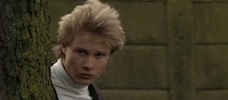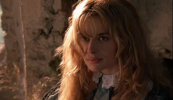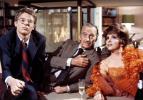Reviews
Jerzy Skolimowski
West Germany / USA, 1972
Credits
Review by Ian Johnston
Posted on 19 August 2011
Source Embassy VHS
Categories Jerzy Skolimowski: Eros & Exile
Literature-to-film adaptation is a fraught business, none more so than when you’re dealing with a writer like Vladimir Nabokov, the value and the rewards to the reader of whose work lie in the pleasures of his language and literary style rather than any concern with narrative, theme, or characters’ psychological depth (there often isn’t any). For all that, a few directors have been tempted to the challenge, both greater talents (Kubrick, Fassbinder) and lesser (Tony Richardson, Marleen Gorris), although even with the most successful efforts - Lolita and Despair - the Nabokovian text still seems most resistant to cinema. Adaptations from Nabokov simply miss the (untranslatable) point of the original and then try to compensate us, to greater or lesser effect, with some variation on the story and characters drawn from the original.
Skolimowski’s film is a minor effort from an uneven part of his career, but credit should be given to his efforts to recast Nabokov in his own exuberant stylistic terms. The script - not by Skolimowski but by Hollywood professionals David Seltzer (The Omen) and David Shaw (responsible for a host of scripts from US TV’s Golden Age) - does a good job of updating Nabokov’s contemporary Germans (1920s Berlin) to the film’s contemporary expats (1970s Munich). The novel was Nabokov’s second, published in Russian in Berlin in 1928 and then translated by Nabokov’s son Dmitri and in Jamesian fashion amended/rewritten by Nabokov himself for English publication in the 1960s (his practice for all his early Russian novels). In it, Berlin industrialist Dreyer agrees to give a job to Franz, the son of a poor provincial cousin, with whom his supposedly frigid wife Martha subsequently embarks on an affair. Martha and Franz’s fantasies of murdering Dreyer are slowly transformed into the specific plan of a staged drowning, which Nabokov’s irony inevitably doesn’t allow to come to fruition in its intended fashion.
For all the novel’s modern features - its detailed depiction of bustling Berlin (including specific references to cinema and cinemas), its irony, its sexual frankness - it looks as much back to modes of nineteenth-century fiction, with such features as a poor cousin’s dependency on his distant richer relative and a lingering female death out of Alexandre Dumas fils. The film’s refashioning abandons that and is a convincing updating. Dreyer is turned into David Niven’s urbane and cynical-decadent English businessman Charles Dreyer; Martha is Gina Lollobrigida’s luscious middle-aged Italian; and Franz becomes English Frank, Charles’s orphaned nephew played by John Moulder-Brown almost as a parody of his role as Deep End’s Mike.
There’s a marvellous passage in Nabokov’s novel where, from one sentence to the next, we slip from the point-of-view of one of the characters to that of another. It’s a sign of the even-handedness of Nabokov’s narration, never in the end privileging one of the characters over another. One of the features of Skolimowski’s cinema, on the other hand, is the way it is resolutely male-centred; he’s the rare example of a male art-cinema director who has never made a film with a central female protagonist. (The immediate contrast is with his peer Polanski and the latter’s Repulsion, Rosemary’s Baby, What? and Tess.) In Skolimowski women are either peripheral to begin with or ultimately marginalised in favour of the male characters. This goes part and parcel with a repeated theme of his work, the Oedipal struggle between father and son figures in which his sympathy almost always lies with the latter, even when played by his own son Michael Lyndon (Success Is The Best Revenge, The Lightship) fighting against surrogate figures (Alexander Rodak, Captain Miller) of himself.
It’s no surprise, then, that in the film the dynamics between the three characters of Dreyer, Martha, and Frank get realigned. The narrative crux then becomes the shift in power and authority from Dreyer to Frank. With Martha’s removal from the scene the whining, maladroit Frank is transformed into a cigar-smoking business-suited mirror-image of his uncle, even usurping his aunt-lover’s position in the household and asserting his authority over the servant staff in place of his in-mourning uncle. Dreyer himself is diminished in stature, no longer the figure of superior power and knowledge (unlike in the novel, he had both become aware of his wife’s affair and suspicious of the murder plot). In this way, the film asserts a typically Skolimowskian thematic, but what gets lost in the abandonment of Nabokov’s narrative even-handedness is the sense - maintained to the novel’s final page - of the utter separateness of each of the characters from one another and their complete mutual misapprehension.
Skolimowski finds his own stylistic equivalent to Nabokov’s cool ironic distance. Skolimowski’s irony comes from pushing everything to extremes, taking elements from the novel and exaggerating them with comic slapstick, absurdities (two girls and their bicycles sitting up a tree), and grotesqueries (the egg-smearing game at Dreyer’s upper-class garden party). This is clearest in the portrayals of Frank and of Professor Ritter, the inventor of the moving mannequins with life-like skin for Dreyer’s store. In the case of Frank, the myopia of the novel is expanded into a comic existential condition: Frank is gauche and clumsy, he affects a whining infantile voice, he’s forever slipping, falling, and stumbling, and he never knows where to put his limbs or how to hold his head; this makes his transformation at the end of the film all the more striking.
Professor Ritter is made more central to the story (now, he lives in Frank’s boarding-house and overhears his lovemaking with Martha) and more grotesque. Mario Adorf hams up the role, twisting his head, body, and hands this way and that, playing up his perversity as he pulls and strokes a sample of his invented human skin; though you do wonder how much Skolimowski, as a Pole directing a German in an English-language film, may have been in control of this performance.
Ritter also turns up in the film’s final moments, bearing a mannequin simulacrum of the now-deceased Martha. Although there is an element of ambiguity here - it’s left up in the air whether this will change the new order in Dreyer’s household - the effect is banal, a sudden last-minute proof offered to Dreyer of Frank’s “guilt.” It seems a pity, as is so much the case with this interesting but uneven film, that a better equivalent wasn’t found to Nakokov’s own crueller final image, in its own way of even more powerful cinematic effect:
Franz marched to the open window. Dreyer crossed the road and sat down on a bench under a tree. Franz closed the window. He was now alone. A woman in the next room, a miserable tramp whom a commercial traveller had jilted, heard through the thin wall what sounded like several revellers all talking together, and roaring with laughter, and interrupting one another, and roaring again in a frenzy of young mirth.
More Jerzy Skolimowski: Eros & Exile
-

The Shout
1978 -

Moonlighting
1982 -

The Lightship
1985 -

Success Is the Best Revenge
1984 -

Torrents of Spring
1989 -

King, Queen, Knave
1972
We don’t do comments anymore, but you may contact us here or find us on Twitter or Facebook.



